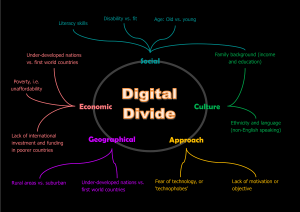Wow! Great job teams, the Great Ed Tech Debate was started strong!
Initially, when I first read all the statements, my opinions was were mostly one sided. This past week, I was reminded how many sides of each story has!
Debate Topic #1: Technology in the classroom enhances learning.
My first response was like “Duh! What would we do without it!” Most of my peers agreed as we saw in the pre vote when around 80% of students believed that this statement was true!
Here are the main arguments that convinced this statement to be true.
- Technology engages students.
- Improves access for teachers and students to receive up to date resources and facts.
- Provides means for all learners with multiple needs.
- Enhances communication and feedback
- Efficient planning and teaching, so teachers can spend time connecting and building relationships.
- Technology allows students to take the lead on inquiry-based learning.
- Students learn skills that will set them up for the future.
Let’s be real, there are countless ways that that technology enhances teaching and learning. However, the apposing team’s statement brought to my attention some very interesting, and accurate points!
Here are the main arguments that convinced this statement to be false.
- Technology distracts students from learning.

- Technology emphasized societal gaps and highlight inequities.
- Less retained when note taking and engaging on technology
- Negative effects on physical, mental, and social health.
While my list for the negative effects of technology is much shorter, they seemed to have hit me in a much deeper way and even as an adult, I can relate to some of the effects!
I hate to admit it but, technology can distract me, in my personal and professional life. While, I love technology and it benefits me in countless ways, I see the detriments it does or can play. Even though I have boundaries and know limits, I can spend too much time scrolling, obsessing over this and that, and then become overwhelmed!
For me, these boundaries and knowledge came with experience and my era of technology development was very forgiving. Today world of technology is much less forgiving. Apps, tools, connections are all being tossed children’s way with little or no guidance, leaving them reliant and obsessive on devices.
Being so incredibly reliant on devices, can make social situations more difficult face to face than over an email or even a phone call. As time goes on the difficulty will only continue to grow as the face to face interactions and connections are not practiced.

With the availability of technology and the joy it brings to children, things such as sports, fitness, sleep, reading and even eating can be pushed aside. We know as adults how time consuming and addictive devices can be and like to think we have the will power to stop, eat, sleep but it even for adults we know it can be challenging. So for children, they really need that guidance.
Lastly, I must agree with the information that is less retained while reading and taking notes on the computer. I am still a person who loves to print off readings, highlight and write notes on the side. I find the same thing with students. When I ask them to play a digital game about a topic, they sometimes rush through and don’t understand the concept, because it appears more abstract. However, a game with blocks and dice, etc. can sometime be much more effective.
In conclusion, both made excellent points about how amazing technology came be. Its quick, effective, engaging, connects us to every possible opportunity out there, but….
The big BUT here is that it is used effectively and proper situations, with an intentional purpose. Technology is amazing, there is no doubt about that, but moderation, boundaries and background education needs to be put in place to make it the best it can be.
Debate #2: Technology has led to a more equitable society.
This topic was slightly different than the last because I was totally split down the middle… I agreed but I also disagreed! I was interested to hear each team’s arguments and see if they could help me decide a favourable position.
Agree Arguments:
- Personalize lessons to meet students learning needs.

- Opportunities to reduce societal gaps.
- Optimize workspaces for people with all abilities.
- Bring awareness to the present gaps in society.
Disagree Arguments:
- The Digital Divide became more emphasised and expanded during Covid Pandemic.
- The gap only becomes larger as society relies more on technology.
Since both teams made amazing points, my opinion remained undecided, much like our first topic.
On the one hand, I have witnessed the life changing tools provided by technology that can give people the ability to see, move, hear, share stories, reduce pain… the list goes on.
Yet, what is unbelievable is that those resources are not shared by all. Due to the discrepancy of resources and knowledge that are attained by different classes, the gap continues to be increase.

While the main culprit is not technology, but the various other continuous systemic issues, technology does play a part in perpetrating those gaps.
In the end, this is such a tricky question because yes, it is completely extraordinary what it can assist people with. However, if it not available, implemented, taught and practiced the gap only grows.

What a great summary Brooke!
I can say from being one of the debaters it was tough to present only one side of the argument. When my group argued against technology facilitating equity I couldn’t help but agree with some of the points the other team was making.
With regards to technology improving education and making it more equitable I think the answer is always “it depends.” I think one of the unintended side effects of social media is that we get drawn into thinking issues are zero sum games (one side wins, at the expense of the other side). I think technology can greatly enhance good teaching practices. As you said inquiry based learning is a perfect example of a collaborative approach to teaching and learning that is facilitated by technology. However I sometimes bite my tongue when I hear about people using it create endless multiple choice tests (I’ve never been a huge fan of this approach) just because the application will automatically mark them. In the end it is an extremely powerful and pervasive tool, but like any it needs to be employed with care.
Great summary! I love your points about tech and equity. So right… it CAN, but it also CANNOT if not implemented properly. I enjoyed your formatting of the blog and the thought-provoking content! Next, we will be discussing our debate! Haha.
Thanks for the detailed summary, it was really helpful when writing a comment on your post (a helpful reminder for sure!). I am sure glad that I wasn’t up first to debate. It was nice to see the process of how things work, and what it would look and sound like. I am nervous to have to debate one side, stick to it, and not sway no matter how convincing the other group may be.
Like Matt, I find technology to be super helpful. I like when teachers are using it properly and for a purpose. But when they are using it to play games day after day, make time fillers, etc. it loses the purpose of what it is for and how it can enhance learning.
Brooke, thanks for the great post. I am also someone who has to print off the readings, highlight points and make notes in the margin. I have notebooks and stickies all over with planning and To-Do lists. I love coloured pens as well and I can’t get that from a screen. It’s just not the same. I also feel it’s important for students to do as much writing as they do typing unless the computer is an accommodation.
On the flip side, I also have my day plan online and love google docs and classroom. I am all about balance and want to think I am doing ok but I’ll admit my phone is often very close to me so I’m not sure I’ve reached my balance yet. It is definitely something I work on in the classroom with my students and at home with my family.